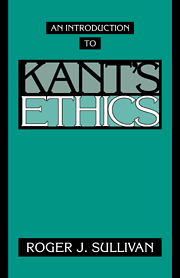Book contents
- Frontmatter
- Contents
- Introduction
- 1 A Beginning: Kant's Political Theory
- 2 The Categorical Imperative: The Ultimate Norm of Morality
- 3 The Formula of Autonomy or of Universal Law
- 4 The Formula of Respect for the Dignity of Persons
- 5 The Formula of Legislation for a Moral Community
- 6 The Limits of the Categorical Imperative
- 7 Morality and Prudence (Foundations 2)
- 8 Moral Character
- 9 Living under the Moral Law
- 10 The Defense of Morality (Foundations 3)
- Suggestions for Further Reading
- Index
1 - A Beginning: Kant's Political Theory
Published online by Cambridge University Press: 05 November 2009
- Frontmatter
- Contents
- Introduction
- 1 A Beginning: Kant's Political Theory
- 2 The Categorical Imperative: The Ultimate Norm of Morality
- 3 The Formula of Autonomy or of Universal Law
- 4 The Formula of Respect for the Dignity of Persons
- 5 The Formula of Legislation for a Moral Community
- 6 The Limits of the Categorical Imperative
- 7 Morality and Prudence (Foundations 2)
- 8 Moral Character
- 9 Living under the Moral Law
- 10 The Defense of Morality (Foundations 3)
- Suggestions for Further Reading
- Index
Summary
If we wish to learn Aristotle's ethical theory, we can turn to his famous Nicomachean Ethics. To learn the fundamentals of Utilitarianism, we can read John Stuart Mill's Utilitarianism. Students are usually introduced to Immanuel Kant's moral theory by reading his treatise with the strange title Foundations (sometimes translated as Groundwork) of the Metaphysics of Morals. Reading just this work can be misleading, however, for unlike Aristotle and Mill, Kant did not present his entire moral theory in a single book. The reason for this is that his philosophical system represented such a break with the past that it took him years to develop all its components.
If we wanted to learn everything he wrote about morality in his mature works, we would need to read his monumental Critique of Pure Reason (1781, revised in 1787), the Foundations of the Metaphysics of Morals (1785), his Critique of Practical Reason (1788), his Critique of Judgment (1790 and 1793), his Religion within the Limits of Reason Alone (1793), and his Metaphysics of Morals (1797) (for which the Foundations was an introduction), as well as An Answer to the Question: “What Is Enlightenment?” (1784), On the Use of Teleological Principles in Philosophy (1788), and On the Proverb: That May Be True in Theory but Is of No Practical Use (1793). During these same years he also published a number of other important works on, among other topics, politics and anthropology, such as Idea for a Universal History from a Cosmopolitan Point of View, Speculative Beginning of Human History, What Is Orientation in Thinking?, The End of All Things, Perpetual Peace, and Anthropology from a Pragmatic Point of View.
- Type
- Chapter
- Information
- An Introduction to Kant's Ethics , pp. 3 - 27Publisher: Cambridge University PressPrint publication year: 1994



